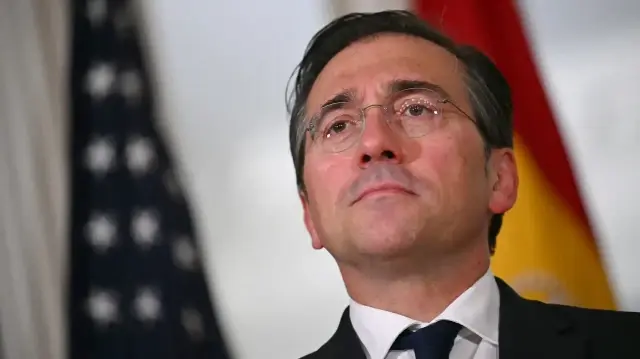OPINION: Spain's sanctions on Israel: From rhetoric to accountability

Whether or not this marks the beginning of Israel's transformation into a regional pariah, Spain's initiative proves that sanctions -- with vision, structure, and cultural backing -- can be more than symbolic, and can serve as the foundation for real accountability
Spain's recent nine-point sanctions package against Israel represents not an isolated decision but the culmination of a shifting political attitude that has been building for years. In several European countries, solidarity with Gaza and the Palestinian people is finally translating [1] into meaningful action. Though delayed in the face of tens of thousands of lives lost in Gaza, these steps carry strategic importance: Europe, which historically played a central role [2] in the creation and support of Israel’s settler-colonial project, is now being forced to confront its complicity more directly than at any point in recent memory.
For decades, European political and financial support [3]—filtered through Washington and global institutions—has acted as a political shield allowing Israel to operate with impunity, enjoying diplomatic immunity and blanket international support. This sustained backing helped normalize a reality where violations of international law became routine and unpunished, reinforcing a sense of exceptionalism in Tel Aviv.
- Spain's break from European consensus
On Sept. 8, Spain announced [4] a comprehensive set of measures—including a ban on arms sales to Israel, restrictions on dual-use goods, and the prohibition of Israeli military vessels carrying equipment from docking in Spanish ports. These steps, taken together, represent one of the most significant breaks in policy by a major European government in decades. Further, the package involved restricting high-level diplomatic engagement, suspending cooperation in selected sectors, and increasing scrutiny of companies operating in Israeli settlements. While strengthening humanitarian support to Gaza, Prime Minister Pedro Sanchez committed to working through EU frameworks aimed at extending similar sanctions continent-wide. These sanctions, however, are more than political maneuvers—they are presented as moral and legal obligations rooted in the recognition of genocide.
In June 2024, Spain formally joined [5] the genocide case against Israel at the International Court of Justice, and in September 2025, public prosecutors announced [6] investigations into several Israeli officials suspected of war crimes and genocide. Such steps make Spain one of the very few European states willing to actively pursue accountability through the mechanisms of international law.
On Sept. 9, Spain joined [9] the Netherlands and Slovenia in imposing entry bans on Israeli far-right ministers Itamar Ben-Gvir and Bezalel Smotrich. While individual bans are unilateral by definition, the Netherlands inserted [10] theirs into the Schengen Information System (SIS), obligating all 29 members of the Schengen Area to deny entry.
On Sept. 18, the Spanish government announced [7] that it would boycott the 2026 FIFA World Cup if Israel qualifies. In yet another unprecedented step, on Sept. 14, protesters disrupted [8] the final stage of La Vuelta cycling race over Israel's participation, demonstrating the growing dynamism of grassroots international politics and the willingness of ordinary people to transform global sporting events into platforms for accountability.
Taken together, Spain is demonstrating a rare integration of public solidarity, legal action, and political symbolism on a wide battlefield: from courtrooms to football stadiums and racecourses. With Germany [11] and the UK [12] still speaking in protectionist tones toward Israel’s conduct, Madrid’s alignment with Ireland, Sweden, Norway, and Belgium showcases a growing fault line within the continent over accountability and justice, a divide that is likely to widen as the war continues.
- Historical memory and diplomatic shifts
Just as importantly, Spain’s shift in tone and posture is breaking decades of diplomatic double-speak. Instead of the usual rhetoric around "Israel’s right to self-defense," Spain emphasizes international justice, moral clarity, and historical guilt. It is also leveraging institutional memory. In the 1970s, Spain voted [13] in favor of UN resolutions affirming Palestinian self-determination. Later, then Prime Minister Adolfo Suarez received [14] Yasser Arafat in Madrid. But over time, Spain adopted the EU’s official line of "balance."
The Israeli genocide in Gaza, however, shattered that dynamic. The unceasing Israeli extermination campaign in Gaza, together with the Palestinian resistance, re-centered Gaza as the true representative of the Palestinian collective experience and revealed the full extent of Israel's criminal actions.
This meant that the Spanish people themselves became partly in charge of their government's position on Palestine. In September 2024, more than 200 trade unions and NGOs called [15] for a 24-hour general strike, raising the ceiling of their demands to the complete severance of all political, economic, and military ties with Israel. Every step taken by Prime Minister Pedro Sanchez’s government since has been a direct response to, and an attempt to satisfy, these demands.
The current Spanish position is thus emblematic, not only a shift in policy but also a seismic cultural and moral reorientation. These sanctions may yet help transform isolated gestures into a collective European front, generating political isolation for an Israel that once seemed untouchable and above reproach. Whether or not this marks the beginning of Israel's transformation into a regional pariah, Spain's initiative proves that sanctions—with vision, structure, and cultural backing—can be more than symbolic, and can serve as the foundation for real accountability.
[1] https://www.theguardian.com/world/2025/sep/11/former-eu-diplomats-urge-suspension-of-blocs-co-operation-agreement-with-israel
[2] https://merip.org/2022/05/settler-colonialism-in-the-middle-east-and-north-africa-a-protracted-history/
[3] https://www.tni.org/en/article/too-little-too-late
[4] https://www.politico.eu/article/spain-pm-sanchez-permanent-weapons-embargo-israel/
[5] https://www.aljazeera.com/news/2024/6/6/spain-says-will-join-gaza-genocide-case-against-israel-at-icj
[6] https://www.aa.com.tr/en/europe/spain-authorizes-investigation-into-israeli-crimes-in-gaza/3691133
[7] https://www.goal.com/en/lists/spain-threatens-to-boycott-2026-world-cup-if-israel-are-allowed-to-participate-as-qualifying-continues/blt7d0ef2bbdcf09412
[8] https://edition.cnn.com/2025/09/14/europe/spain-cycling-protest-vuelta-gaza-israel-latam-intl
[9] https://www.timesofisrael.com/spain-bans-far-right-lawmakers-smotrich-ben-gvir-in-latest-reciprocal-rap/
[10] https://www.trtworld.com/article/5a1af8434295
[11] https://gpil.jura.uni-bonn.de/2024/01/germany-rushes-to-declare-intention-to-intervene-in-the-genocide-case-brought-by-south-africa-against-israel-before-the-international-court-of-justice/
[12] https://www.reuters.com/world/uk/britain-has-not-concluded-israels-actions-gaza-are-genocide-2025-09-09/
[13] https://www.palquest.org/en/highlight/35847/spain-and-palestine-question
[14] https://www.degruyterbrill.com/document/doi/10.1515/9783110642148-003
[15]https://www.business-humanrights.org/en/latest-news/spain-unions-and-ngos-demonstrate-against-genocide-in-palestine-and-push-govt-to-cut-all-ties-with-israel/
*Opinions expressed in this article are the authors' own and do not necessarily reflect Anadolu's editorial policy.
Reklam yükleniyor...
Reklam yükleniyor...







Comments you share on our site are a valuable resource for other users. Please be respectful of different opinions and other users. Avoid using rude, aggressive, derogatory, or discriminatory language.